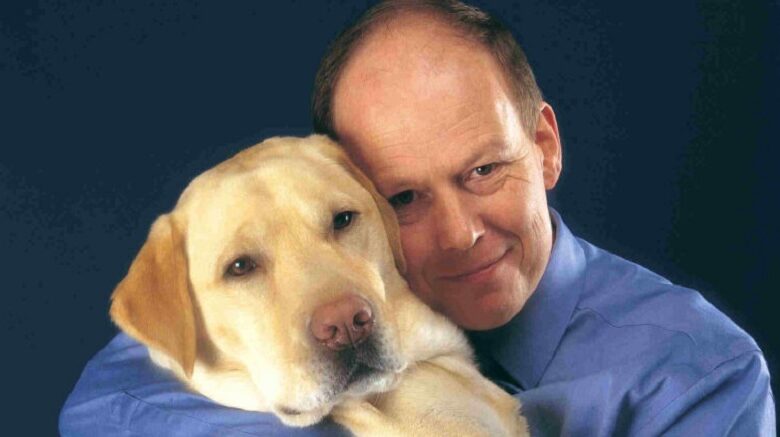
Allen Parton: the Royal Navy veteran whose life was saved by his assistance dog Endal
Allen Parton is a 61-year-old Royal Navy veteran who lives in Clanfield, East Hampshire. Allen became disabled after a horrific accident in the Gulf War in 1991. He made it into the public eye after he met Endal the dog, who later became the most famous assistance dog in the world.
Our writer, Emma Purcell, got the opportunity to interview Allen Parton about what it was like becoming disabled, Endal saving his life and the launch of his charity Hounds for Heroes.
Allen Parton becoming disabled
What injuries did you sustain in your tragic accident in the Gulf?
I spent five years in hospital. I lost the memory of my wife Sandra, my children Liam and Zoe, and I couldn’t read, write, walk, or talk.
The advice to my wife (who is a fully qualified nurse) was to divorce me, put me in a war pensioner’s home and move on because I wasn’t going to recover.
The hardest thing was that part of my head injury robbed me of emotions. I didn’t know love, hate, happiness or sadness.
One moment, I was in the Gulf and then the next minute, I was surrounded by people I didn’t know or love. I didn’t love my own children. I didn’t like their noise or vivaciousness. My poor children lived in a war zone of their own.
Ironically, I can remember what I did in the Royal Navy in 1976 like it was yesterday, but I can’t remember walking down the aisle with my wife when we first got married or the birth of my children.
It’s quite hurtful how the brain will decide for you what you remember and what you don’t.
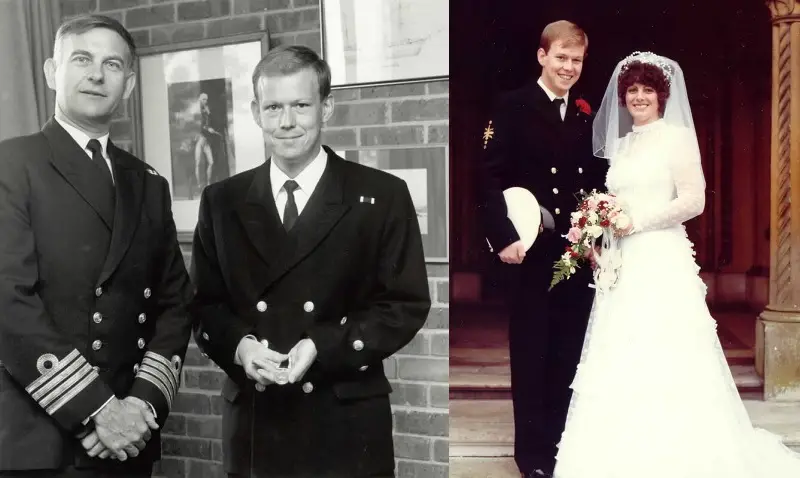
What support did you receive following your accident?
My family had been very well looked after in the aftermath. My daughter was funded through education and is now a Play Therapist. My son was given a huge opportunity and he’s now a manager of Waitrose in Guilford.
The Naval charities were never going to leave us struggling and supported us in our hour of need. We were living in Emsworth in married quarters. When I was in the hospital, my family were evicted and made homeless.
It was the British Legion that stepped in and found us a house that we could rent and then make that step to getting on the mortgage ladder. But we couldn’t have done that unless the charities were there.
What were your initial thoughts when you found out you would be disabled?
This is going to sound awful, but I wish I’d been more disabled. I was forgetting things every day. I would put a plan in place and then the next day I would have forgotten it. It was like Groundhog Day.
While I was in Headley Court – a defence medical rehabilitation centre in Surrey – I had two major attempts at suicide. But that was because I was losing a Naval career that I loved.
To be quite honest, I’m 61 now, but I’d always had the vision that when I got to 60 I wouldn’t be in the wheelchair anymore.
I’ve always struggled against my disability. I don’t have a chairlift in the house. I still bump up the stairs on my bum because I never wanted my children to grow up in a house of someone who was disabled.
In a strange sort of way, I really didn’t accept my disability until the day I had to apply for Endal. Then, my outlook changes, which was incredibly cathartic.
Allen Parton and Endal
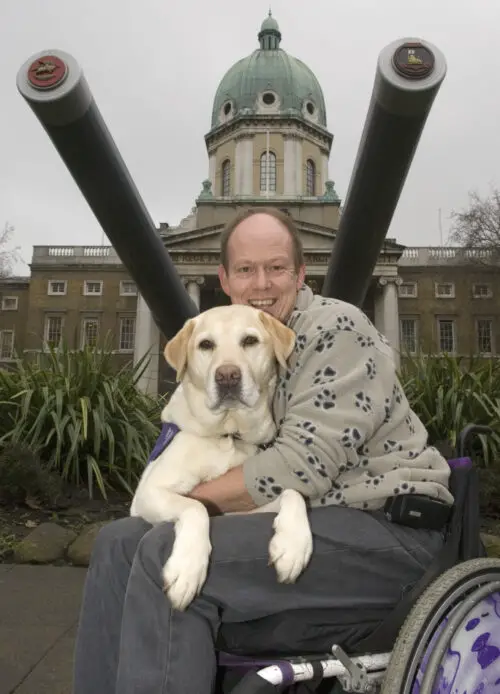
How were you introduced to getting an assistance dog?
In the early days, I was going to the Horizon Day Care Centre in Portsmouth. During this time, my wife Sandra became a puppy parent for Canine Partners and was training a yellow Labrador called Ferdy.
One day my daycare bus didn’t turn up, so Sandra decided to take me to the Canine Partners’ training centre for puppy class. The puppy class commenced and I just sat there in my own little world.
That day there was a little 11-month-old Labrador called Endal who had health and attitude problems. If you asked him to do something, he wouldn’t do it, which in the assistance dog world is not that good.
Endal was a very clever dog, but he just chose not to do it. Because of this, and his health problems, he was going to be a career change dog.
Endal was only up there that morning to do a bit more socialisation so that when he was rehomed he would be good with other dogs and people.
But that morning he saw a miserable old chap at the other end of the training room with something on the floor. So, he got up, trotted across the training centre, picked the item up and put it in my lap. He sat there and he didn’t get a reaction.
He then went off to the mock-up supermarket, took a tin off the shelf, went to the grooming parlour, took a brush off it, and put them in my lap.
After half an hour, Endal was filling my lap full of everything. I think there was even a little puppy in there somewhere. Eventually, just before I completely disappeared under a mountain of stuff, the brain switched on and I smiled.
That night they let Sandra come home with Endal and Ferdy, and the rest is pretty much history.
What kind of tasks could Endal do to support you?
When I couldn’t speak, he learnt sign language. When I touched my head, it meant hat. When I touched my face, it meant razor. When I touched my chest, it meant coat.
He learnt to put me in the recovery position, cover me with a blanket and hit the emergency phone. If that didn’t work, he would bark out the window for help. And if no one heard him, he’d go and get help.
When we’d go out in the village, I would forget to look before crossing a road, but Endal would always stop me and remind me it was a road.
How did you manage to regain verbal communication and emotions?
Following my injury, I lived in a very silent world. But with Endal, I was trying to grunt or make communications.
I strongly believe that if there’s an animal on the planet that can teach a human lost emotion, it is a dog.
Every day that dog made me laugh, even when I didn’t want to. He also taught me to hate, because I genuinely hate people that are cruel to animals.
Endal also helped me to re-connect with my wife and re-build our marriage. One day I said I don’t remember being married. Then Sandra said: “No, you don’t remember the first time, but you will the second.”
So, in 2002, Sandra and I got remarried with Endal as my best man. Initially, we were told we could only do a blessing, but I didn’t want to bless someone I couldn’t remember. So, we got permission from the church to get married again properly.
When we said “for better and for worse” the second time, I understood a bit more.
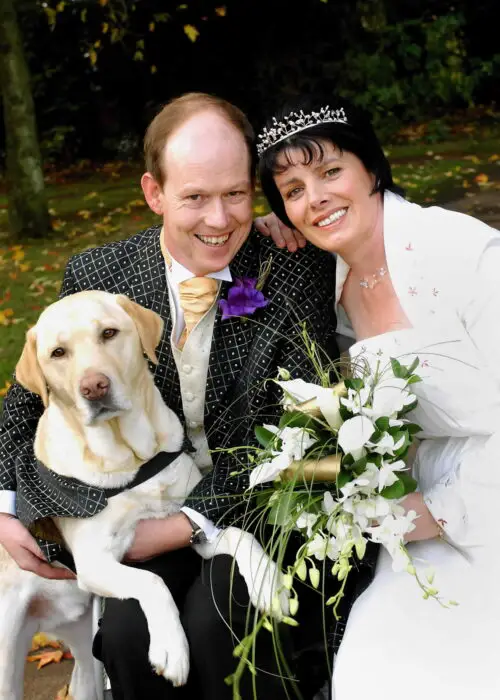
Moreover, Endal kept encouraging me to make noises. Then, one day, I said something – word barked out, which encouraged me to bark out more words. Soon, barked words became stuttered sentences, which then became full, clear sentences. Nowadays, you can’t shut me up.
How did Endal’s story get media coverage?
The world’s press picked up on this amazing dog after a reporter witnessed Endal operating a cash machine. He’d insert the card for me, I did the buttons and Endal retrieved the card, money and receipt.
Next thing we knew, Endal was in every newspaper around the world. He was voted dog of the millennium and won numerous awards.
We had a film crew come to my house and they filmed Endal carrying out a range of tasks, such as collecting my razor, getting my mobile phone, passing me breakfast cereal, picking up items and going to the local shop.
When the film went out on the BBC, I think everyone was blown away. They knew there were guide dogs, but assistance dogs hadn’t really hit the world’s media until that point.
In addition, Sandra and I wrote a book titled Endal, in which we tell the story about my injury, the events that unfolded afterwards and how Endal saved our lives, marriage and family.
Allen Parton on assistance dog EJ and launching Hounds for Heroes
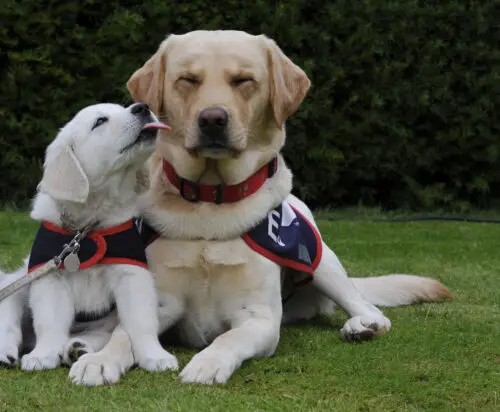
After Endal died, how did Endal Junior (EJ) become your next assistance dog?
Not long after we released the book, Endal’s health deteriorated and, eventually, at 13 years old, we had to put him to sleep.
Just before this, we’d got Endal Junior (EJ), an 11-month old Labrador who we knew would eventually take the reigns from Endal. He was the first dog to be trained under the support of my charity Hounds for Heroes.
Although Endal and EJ are from different breed lines, as EJ has got older, he looks more similar to Endal in many ways.
EJ loved Endal to pieces. He used to follow him and copy him. When Endal died, EJ went over to him, kissed him goodbye and then went up to the corner, picked his lead and jacket and took over.
Like Endal, EJ can operate a cash machine, traffic lights, light switches, lift buttons, get the post, draw the curtains and can even use an oyster card.
If I fall unconscious in the bath, EJ knows to keep my head above water, pull the plug out and then raise the alarm.
I know Endal’s looking down with great pride, knowing his protégé has stepped into the breach.
How did you launch Hounds for Heroes?
Endal was the reason I set up Hounds for Heroes. If a dog can bring you back to your family after military combat, it’s got to be a good thing.
After years at Canine Partners, I realised that “my audience” of military veterans, who have this stoic stubbornness in the services, weren’t seeing the value of an assistance dog.
There are organisations out there, but they weren’t meeting our needs and psychology and weren’t understanding us.
When I had Endal, I had to pay for his food, insurance and veterinary costs, all on a war pension. This was a struggle, especially when you’ve got children.
So we decided that we would set up a charity called Hounds for Heroes for injured servicemen and women, but also the emergency services.
One of the key things was that we would fully fund the cost of the dog. We’d pay for food, veterinary cost and insurance.
Who is Rookie and what is his role at Hounds for Heroes?
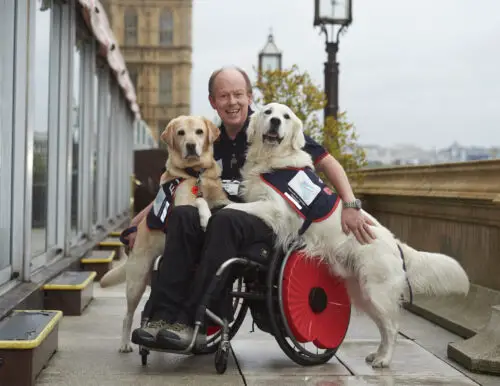
Rookie is a dog that we take around the country to do demonstrations at events and to meet veterans that are too disabled to come to us. I can’t just go with EJ because he won’t work for anyone but me. But Rookie will bounce into anyone’s home.
The rule is that if Rookie can’t overcome the disability that presents, then there isn’t a dog on the planet that can. He will look at you, know what your weakness is and become your strength.
For instance, we had one policeman who sustained a badly injured back while on duty. He felt a fraud because he was in a room for blown-up servicemen with visible disabilities, but he still had a physical injury.
During our visit, he needed to lie down because his back was about to go into spasm. Seeing this, Rookie just got up, laid next to him, cuddled up and passed him his blanket.
Since then, we’ve placed a dog with the injured policeman, and it’s changed his life.
How many working partnerships have you created so far and how has the charity managed during the coronavirus pandemic?
We’ve created an amazing 18 working partnerships so far. We’ve got 22 puppies in the pipeline at the moment.
Covid has had an impact on what we’re doing, but we’ve been managing to do one-on-one Zoom puppy classes, which is working quite well.
With our other dogs, who would have been coming into advanced training, we’ve sent them on a gap year. So for now, they’re getting to live with lovely families and continue to work on the commands and maintain the skills they’ve learnt until advanced training can resume.
What advice would you give to other disabled veterans and service personnel trying to re-gain their independence?
Never let your disability define you. Never let your disability become you. I always say; “I’m Allen Parton and I’m disabled… I’m not a disabled person.”
When you become disabled, it isn’t going to get better and life will be a struggle. But you’ll soon find the inner strength to deal with it.
Visit the Hounds for Heroes website or follow them on Facebook, Twitter, Instagram and YouTube to find out more about the charity, apply for a dog or donate.
By Emma Purcell – follow her blog Rock For Disability
More on Disability Horizons…